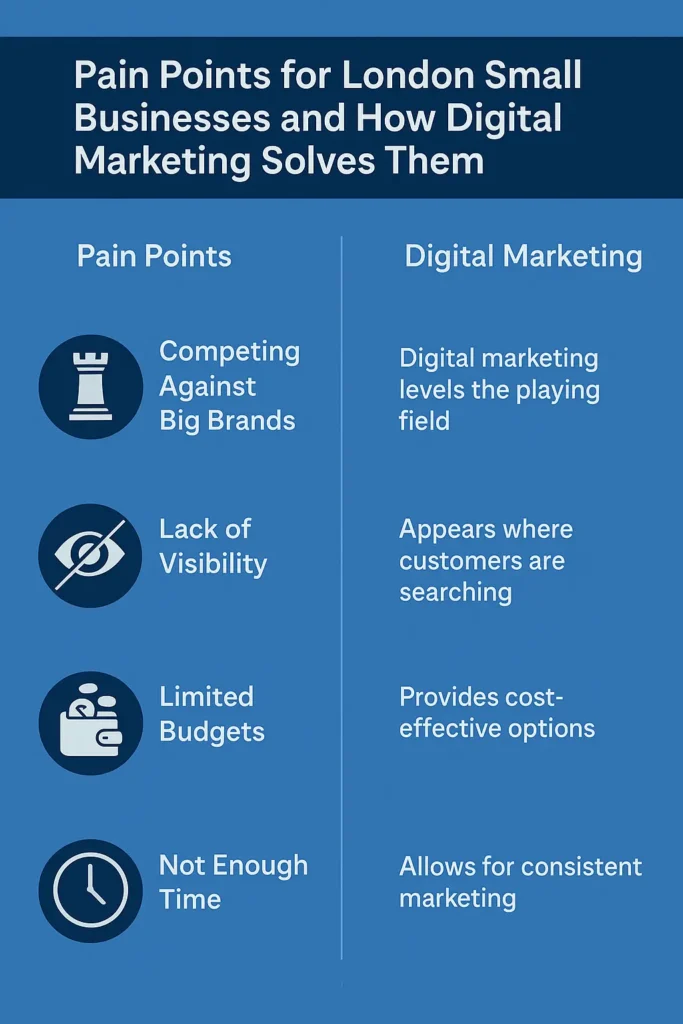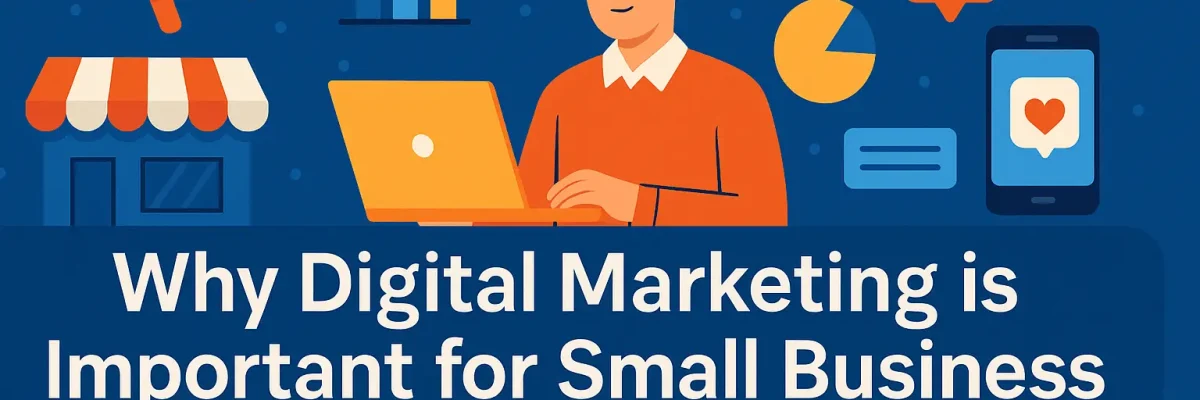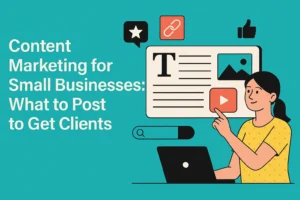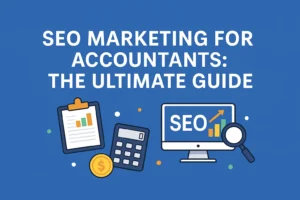Imagine this. You have just launched a small coffee shop in Shoreditch, London. The menu is perfected, your team is trained, and the interiors are designed to impress. Yet after a few weeks, you notice the seats are still half empty. It is not that your product lacks quality, the problem is that people do not know you exist.
This is the challenge faced by many small business owners. In a city as competitive as London, digital marketing for small business is no longer a nice-to-have. It is an essential part of building visibility and growth. Research shows that more than 80 percent of consumers search online before making a purchase decision (Think With Google, 2023). If your business cannot be found online, you are essentially invisible to the majority of your potential customers.
The positive news is that digital marketing is not reserved for big brands with large budgets. Small business owners can also use it effectively. Compared to traditional advertising, which is expensive and often impossible to measure, digital marketing for small business owners is cost efficient, highly targeted, and scalable. Whether you are running a bakery in Camden, a boutique in Soho, or an accounting practice in Canary Wharf, the right digital strategy allows you to connect with the right people at the right time.
In this guide we will explore 10 practical ways digital marketing helps small businesses grow in London. From local SEO and social media marketing to paid ads and reputation management, you will see why digital marketing is not just important but essential for long term success.
Why Digital Marketing Matters for Small Businesses in London
Running a small business in London is exciting but also challenging. You are competing with larger brands that have bigger budgets, established reputations, and strong marketing teams. Many small business owners rely on word of mouth or repeat customers, but that alone rarely drives consistent growth. This is where digital marketing for small business makes a real difference.
According to research by the Federation of Small Businesses, there are more than 1.1 million small businesses in London. With so many competitors in almost every sector, visibility becomes a survival factor. Digital channels such as Google, Facebook, Instagram, and LinkedIn allow small businesses to stand out even when competing against much larger companies.
The numbers speak clearly. A study by Deloitte found that small businesses with a strong digital presence achieve revenue growth that is three times faster than those with minimal digital engagement. Another survey by Smart Insights revealed that over 70 percent of consumers are more likely to buy from a business that has an active social media presence. These figures show why online visibility and engagement are directly linked to sales.
Small business owners in London also face specific challenges. Advertising space in the city is expensive and local competition is fierce. Digital marketing levels the playing field by allowing even the smallest companies to reach their ideal customers at a fraction of the cost of traditional marketing.
More importantly, digital marketing offers measurable results. You can see exactly how many people viewed your ad, clicked your website, or signed up for your newsletter. This kind of transparency gives small business owners the confidence that their investment is paying off.
In the next section, we will look at 10 practical strategies that prove why digital marketing is essential for small businesses in London.
10 Things You Can Do With Digital Marketing for Small Business
1. Get Found with Local SEO
One of the most powerful ways to attract new customers is to optimise your business for local searches. When someone types “coffee shop near me” or “accountant in Canary Wharf” into Google, they are showing strong intent to buy. Research from Google shows that 76 percent of people who search for something nearby visit a related business within 24 hours and 28 percent make a purchase.
For small business owners in London, this means ranking in the “map pack” is a game changer. By setting up a Google Business Profile, optimising your website with local keywords, and collecting customer reviews, your business can show up at the exact moment customers are ready to buy. Local SEO is one of the cornerstones of digital marketing for small business because it generates consistent leads without ongoing ad spend.
2. Create a Google Business Profile
Your Google Business Profile is the digital equivalent of your shop window. It is often the first thing customers see before they even visit your website. A complete profile includes your business name, address, phone number, opening hours, photos, and customer reviews. Businesses with a fully optimised Google profile are 2.7 times more likely to be considered reputable according to Google’s own data.
For a small business in London, where local competition is high, this visibility is priceless. Imagine a potential customer searching for “florist in Notting Hill.” If your Google profile has up-to-date information, recent posts, and positive reviews, you immediately stand out. Small actions like posting updates or asking loyal customers for reviews can dramatically improve trust and click-through rates.
3. Use Social Media Marketing to Connect with Your Audience
Social media is no longer just for big brands. Platforms like Facebook, Instagram, TikTok, and LinkedIn give small businesses the chance to reach customers directly. For London-based businesses, this means being part of conversations that happen daily in your community.
According to Statista, 57 million people in the UK actively use social media, which is more than 84 percent of the population. Small businesses that post consistently, share behind-the-scenes updates, and use video content to explain their products or services build stronger connections with their audiences.
For example, a bakery in Camden might post Instagram Reels showing the morning baking process, while a consultancy in Westminster might share LinkedIn posts explaining the latest tax changes. These approaches not only build engagement but also establish trust. Social media is a cost-effective and highly personal way to strengthen your brand and attract new clients, making it a vital part of digital marketing for small business.
4. Run Affordable Paid Ads
Many small business owners assume paid advertising is only for large companies, but platforms like Facebook and Google allow you to start with very small budgets. Even £10 a day can make a noticeable difference.
Google reports that businesses make an average of £2 in revenue for every £1 spent on Google Ads. For small businesses in London, this means that even a modest budget can deliver strong returns when campaigns are well targeted. Paid ads also give instant visibility, which is especially important for new businesses that are not yet ranking organically.
Facebook and Instagram ads allow you to target by location, interests, and behaviours. Imagine you run a yoga studio in Hackney. With a carefully designed campaign, you can target local residents interested in health and fitness, ensuring your ad money is spent on reaching people who are most likely to convert. Paid advertising works best when paired with organic marketing, making it an important part of digital marketing for small business.
5. Start a Blog That Solves Problems
Blogging is one of the most underrated yet effective strategies for small businesses. It builds trust, improves SEO, and educates potential clients. A blog allows you to answer the exact questions people are typing into Google.
HubSpot research shows that businesses that blog regularly generate 67 percent more leads per month than those that do not. For a small business in London, this could mean writing articles such as:
- “5 Things to Know Before Starting a Business in London”
- “How to Save on Business Rates in the UK”
- “Simple Marketing Tips for Local Shops in London”
When blogs are optimised for keywords like digital marketing for small business and linked to your services, they not only bring in traffic but also convert readers into paying clients. Blogging positions you as an expert and creates long-term assets that keep driving leads year after year.
6. Leverage Email Marketing to Keep Customers Coming Back
Acquiring new customers is expensive. Email marketing helps small businesses maximise the value of existing customers by keeping them engaged. Unlike social media, where algorithms control visibility, email gives you direct access to your audience.
According to Campaign Monitor, the average ROI for email marketing is £36 for every £1 spent. This makes it one of the most cost-effective tools available. For a London café, this could mean sending weekly updates about seasonal menu items. For a local consultancy, it could be sharing free guides or reminding clients about upcoming deadlines.
Small touches like personalised subject lines and exclusive offers can increase open rates by 50 percent (Experian). With the right email strategy, you not only drive repeat business but also create loyal customers who recommend you to others. That is why email marketing remains a cornerstone of digital marketing for small business.
7. Build a Mobile-Friendly Website
Your website is often the first impression a customer has of your business. In London, where people are always on the move, most searches happen on mobile devices. Statista reports that over 65 percent of UK web traffic now comes from mobile. If your website loads slowly or is hard to use on a phone, potential customers will leave within seconds.
A mobile-friendly website is not just about design. It needs to load quickly, be easy to navigate, and include clear calls to action such as “Book Now” or “Get a Free Quote.” Google also ranks mobile-friendly websites higher in search results, which directly impacts visibility. A well-designed site is therefore one of the most important investments in digital marketing for small business.
8. Create Engaging Video Content
Video has become one of the most powerful marketing tools. According to Wyzowl’s 2024 report, 91 percent of businesses use video as a marketing tool, and consumers say they are twice as likely to share video content compared to any other type of content.
For small businesses, video does not need to be expensive. Short clips on Instagram Reels, TikTok, or YouTube can showcase your products, introduce your team, or answer customer questions. For example, a London bakery might film the process of making pastries each morning, while a small consultancy could record simple tax tips for startups.
Video adds personality and trust, making customers feel connected to your brand. It is a highly effective and affordable way to build brand awareness, especially in competitive local markets. That is why video creation is quickly becoming essential in digital marketing for small business.
9. Manage Your Online Reputation Through Reviews
In a city like London, where competition is intense, online reputation can make or break a small business. According to BrightLocal, 87 percent of consumers read reviews for local businesses and 79 percent trust online reviews as much as personal recommendations.
For small business owners, collecting positive reviews on Google, Trustpilot, or Yelp can instantly increase credibility. Businesses that consistently respond to reviews are also seen as more trustworthy. Reviews not only influence buying decisions but also improve local SEO rankings. This means more visibility and more clients. Reputation management is one of the most cost-effective strategies within digital marketing for small business.
10. Track Results with Analytics
One of the biggest advantages of digital marketing is measurability. Unlike traditional ads where results are uncertain, digital tools allow you to track every click, view, and enquiry. Google Analytics, for example, shows you exactly how visitors found your site, which pages they read, and how many converted into customers.
For small business owners, this data is invaluable. It ensures your marketing spend is going into channels that work, and it highlights areas that need improvement. According to McKinsey, companies that make data-driven decisions are 23 times more likely to acquire customers and 19 times more likely to be profitable.
By regularly reviewing performance, you can adapt quickly and make sure your investment in digital marketing for small business keeps delivering results.
Pain Points for London Small Businesses and How Digital Marketing Solves Them

Running a small business in London is rewarding, but it also comes with unique challenges. The city is crowded with competition, customer expectations are high, and costs continue to rise. These pressures often leave small business owners feeling stuck. Here are the most common pain points and how digital marketing for small business can help.
1. Competing Against Big Brands
Large companies dominate traditional advertising channels like billboards, print, and radio. Their budgets are simply out of reach for most small businesses. Digital marketing levels the playing field. With tactics like local SEO and targeted paid ads, small businesses can appear directly in front of their audience without needing millions in advertising spend.
2. Lack of Visibility
Many small business owners say, “People love us when they find us, but not enough people know we exist.” This is a visibility problem. Digital marketing solves it by making sure your business appears where customers are searching, whether on Google, social media, or local directories.
3. Limited Budgets
Traditional marketing is expensive and often hard to track. Digital marketing offers small businesses cost-effective options that can start from as little as £5–£10 per day. More importantly, every click and lead can be measured, so you know exactly where your money is going.
4. Not Enough Time
Small business owners in London wear many hats. Managing operations, customer service, and finances leaves little time for marketing. Digital marketing strategies like scheduled social media posts, automated email campaigns, and outsourced content creation allow you to market consistently without losing focus on your core business.
5. Difficulty Building Trust
In a competitive city, customers are cautious. They want proof that your business is reliable before committing. Reviews, case studies, and social media content all work as forms of digital trust. In fact, research shows that 88 percent of consumers trust online reviews as much as personal recommendations (BrightLocal, 2023). By actively managing your online reputation, you turn strangers into paying clients.
Digital marketing directly addresses each of these pain points, giving small businesses the tools to compete, get noticed, and grow sustainably.
London is one of the most competitive business cities in the world. For small business owners, surviving and thriving in this environment requires more than hard work and a great product. Visibility is everything. Without it, even the best ideas can go unnoticed. This is why digital marketing for small business is not just important but absolutely essential.
The strategies we have explored, from local SEO and social media marketing to paid ads, content creation, reputation management, and analytics, give small businesses a cost effective way to grow. Unlike traditional advertising, digital marketing allows you to target your ideal customers, measure your results, and build trust at scale.
The businesses that succeed in London are not always the biggest or the most established. They are the ones that show up consistently where their customers are searching, scrolling, and making decisions. By investing in digital marketing for small business, you create more opportunities for growth, attract high quality clients, and give yourself the tools to compete with confidence.
I have been helping small business owners build visibility and generate leads through digital marketing for over five years. If you are ready to take your business to the next level, I would love to help.
👉 Get in touch today to book a free consultation and discover how digital marketing can transform your small business in London.
What is digital marketing for small business?
Digital marketing for small business refers to using online channels — such as search engines, social media, email, content, and paid ads — to reach, engage, and convert customers.
Why is digital marketing important for small businesses in London?
Because consumers increasingly search online for local services. A strong digital presence helps a London small business compete, build trust, and attract customers where they are searching.
How long does it take to see results from digital marketing?
It depends on the strategy. Paid ads can deliver leads immediately, while SEO, content marketing, and reputation building often take 3 to 6 months to show consistent results.
How much should a small business spend on digital marketing?
There is no one-size-fits-all answer. Many recommend allocating 5–10% of your revenue or starting with a modest budget and scaling based on performance.
Which digital marketing channels should I prioritise?
Start with what gives results fastest: local SEO, Google Business Profile, social media, and paid search. Over time add content marketing, email campaigns, and reputation management.
Can social media marketing help my small business?
Yes. With consistent posting, engagement, and targeted ads, social media can build awareness, humanise your brand, and drive leads.
Do I need to run paid ads to succeed?
Paid ads are powerful for quick visibility and lead generation, but many small businesses grow long term with SEO, referrals, content, and reputation. Ads help accelerate growth.
What role do customer reviews play in digital marketing?
Reviews are essential: 87% of consumers read reviews for local businesses (BrightLocal). Positive reviews build trust, boost conversions, and support local SEO.
Should I hire an agency or do digital marketing myself?
It depends on your time, expertise, and budget. Some small businesses do well in-house using templates and automation. Others benefit from hiring a specialist for strategy, execution, and scale.
How do I measure success in digital marketing?
Track metrics like website traffic, leads generated, conversion rate (leads → customers), cost per lead, and return on ad spend (ROAS). Use tools like Google Analytics and platform dashboards.





